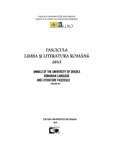MEMORY AS THE FATHOM OF HISTORY. “CARTEA ŞOAPTELOR” (THE BOOK OF WHISPERS) BY VARUJAN VOSGANIAN
MEMORY AS THE FATHOM OF HISTORY. “CARTEA ŞOAPTELOR” (THE BOOK OF WHISPERS) BY VARUJAN VOSGANIAN
Author(s): Dana SalaSubject(s): Literary Texts
Published by: Editura Universitatii din Oradea
Keywords: memory; history; Armenian Genocide; violence; contemporary Romanian literature; Armenian writers of Romania; mourning; 20th century; collective memory and poetry; Varujan Vosganian.
Summary/Abstract: As an autobiographical novel, Cartea şoaptelor (The Book of Whispers) written in Romanian language by the Armenian author Varujan Vosganian, creates its own patterns of fiction. The essential act is for the author to find his voice, a voice fully in resonance with the collective self. He achieves this new consciousness starting from his own childhood memories. Collective memory is more resistant than death. The author transgresses the dichotomy document versus fiction. The author’s mission is to capture that meaning of suffering which resurfaces the identity of any people or of any community. Having the courage of the collective self, transposed into the mission of a lifetime, the poet can venture into the inferno of the 1915 genocide and can risk representation. Paradoxically, the space given to death and the dead ones in Cartea şoaptelor does affirm even more powerfully the principles of life. The substance of this novel is a poetic one as only poetry can transgress the wounds of history and restore the nearness between the living and the dead.
Journal: Analele Universităţii din Oradea Fascicula Limba si Literatura Română (ALLRO)
- Issue Year: 20/2013
- Issue No: 1
- Page Range: 53-66
- Page Count: 14
- Language: English
- Content File-PDF

